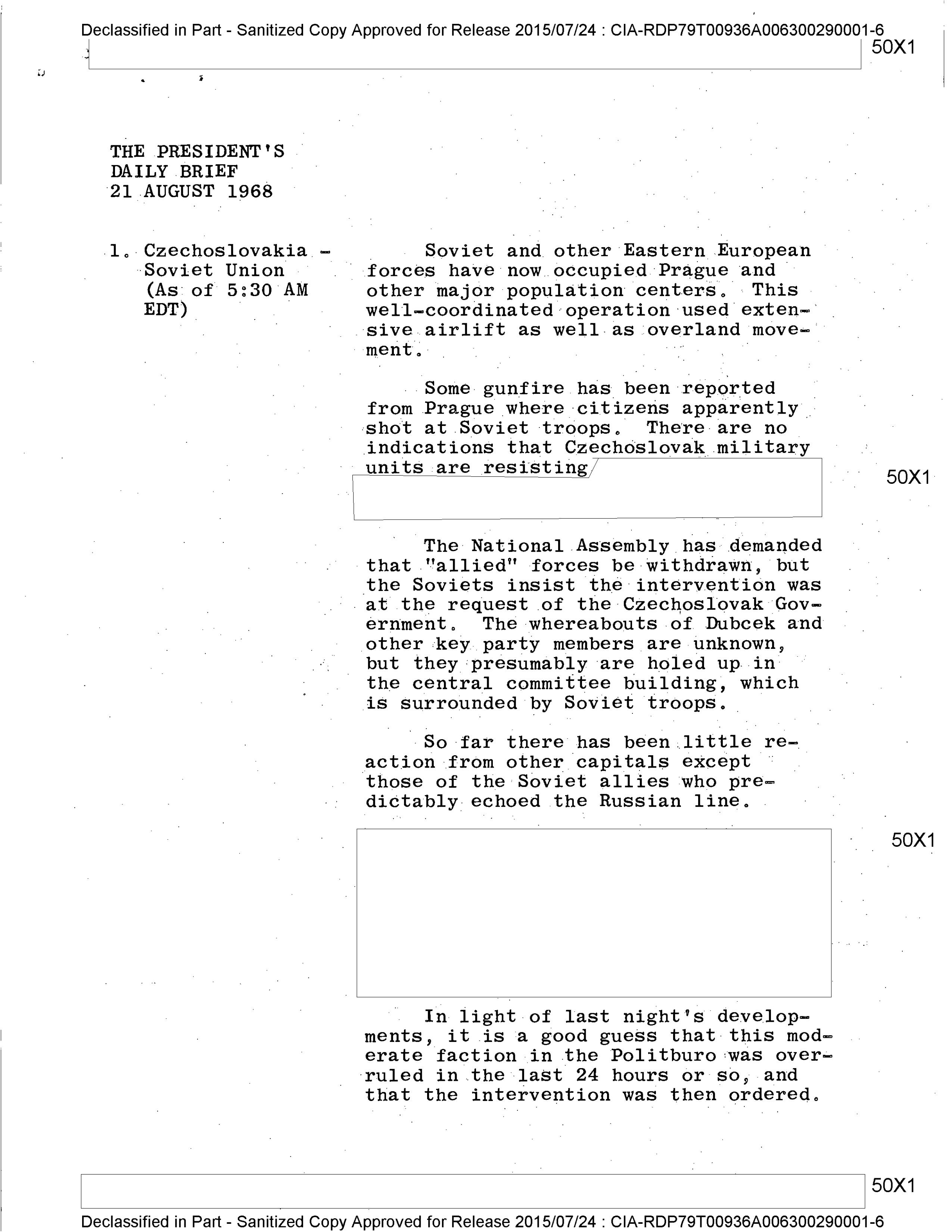$12.95
President Lyndon B. Johnson CIA Daily Briefings
President Lyndon B. Johnson CIA Daily Briefings
13,564 pages of briefings prepared by the Central Intelligence Agency (CIA) for President Lyndon Baines Johnson, dating from November 22, 1963, to January 20, 1969.
The CIA prepared these documents for President Johnson; they summarize the day-to-day intelligence and analysis on current and future national security issues. These documents allow researchers to access deeper insights into the particulars of the LBJ presidency based on intelligence provided to him, by the CIA.
The President’s Daily Brief (PDB) is a daily summary of high-level, all-source information and analysis on national security issues produced for the president and those the president chooses to share the information with, such as key cabinet members and advisers. The briefing has been published in one form or another, under one title or another since 1946.
The former CIA Inspector General John L. Helgerson described the PDB as, “probably the world's smallest circulation, most highly classified, and in some respects, best informed daily newspaper.”
The format of these reports, PICLs (President’s Intelligence Checklists), was first presented to President Kennedy on June 17, 1961. The PICLs provided to JFK were not shared with Vice President Johnson under the instruction of Bromley Smith, Kennedy’s intelligence assistant.
The format of the PICL remained the same after the assassination of President Kennedy until President Johnson's wishes for changes took effect in what became his President’s Daily Brief (PDB) on November 17, 1964.
In July 2000, then CIA Director George Tenet told the National Archives and Records Administration that no PDB (President's Daily Brief) should be released “no matter how old or historically significant it may be.”
On April 8, 2004, National Security Advisor Condoleezza Rice testified in front of the National Commission on Terrorist Attacks upon the United States, about a PDB from August 6, 2001, titled "Bin Ladin Determined to Strike in US." Two days later President Bush ordered the release of the PDB.
In 2015, the CIA began declassifying CIA daily briefings made for the president, created in the 1960's and 70's.
The briefings prepared for President Johnson cover major events involving all aspects of the Soviet and Eastern Bloc relations.
North and South Vietnam, intelligence about the Gulf of Tonkin attacks (August 1964), deployment of major U.S. forces to Vietnam (July 1965), Honolulu Conference (February 6-8, 1966), Manila Conference and President's Asian Trip (October 17-November 2, 1966), March 31st 1968 Speech, LBJ's remarks on decision not to seek re-election.
Coverage is also given to the 1968 Balance of Payments Program, The Congo and Congo C-130 Crisis (July 1967), Cyprus Crisis (December 1963-December 1967), Dominican Republic, Dominican Crisis (1965), Gold Crisis private gold buying by hoarders (November 1967-March 1968), Guantanamo Water Crisis (February 1964), Indian Famine (August 1966-February 1967), The Kennedy Round of GATT negotiations (April-June 1967), March 31st 1968 Speech - LBJ's Remarks on Decision not to Seek Re-Election, Middle East Crisis (May 12-June 19, 1967), Non-Proliferation Treaty, OAS Summit Meeting (April 1967), Panama Crisis (1964), Pueblo Crisis (1968), South Asia (1962-1966), and the Trilateral Negotiations and NATO (1966-67).
President Lyndon Johnson read his first Daily Brief the day after the JFK assassination in Dallas. JFK had excluded the vice president from the inner circle of national security personnel, something no president has repeated.
The first briefing in this collection, written on November 22, 1963, the day of the Kennedy assassination, contains a poem by Spanish matador Domingo Ortega, quoted by President Kennedy to a group of newspaper journalists, the day he learned of the presence of Soviet missiles in Cuba.
"Bullfight critics ranked in rows
Crowd the enormous plaza full
But only one is there who knows
And he's the man who fights the bull"
Documents Include:
November 22, 1963 - South Vietnam
Vietnamese Communist efforts to discredit the new Saigon regime stayed in high gear this week.

November 25, 1963 – Lee Harvey Oswald
Oswald - Press stories to the effect that Lee Harvey Oswald recently visited Mexico City are true, according to our information. Oswald visited both the Cuban and the Soviet embassies on 28 September. He was trying, we are told, to arrange for visas so that he could travel to the USSR via Havana. He returned to the US on 3 October.

Aug. 3, 1964: The Tonkin Gulf
North Vietnam - Yesterday’s attack on USS Maddox was planned and directed by naval authorities ashore. In recent weeks intercepts have shown Hanoi’s navy reacting with greater touchiness to US and South Vietnamese activities in the Tonkin Gulf. Maddox and the accompanying Turner Joy are still under intense Vietnamese surveillance.
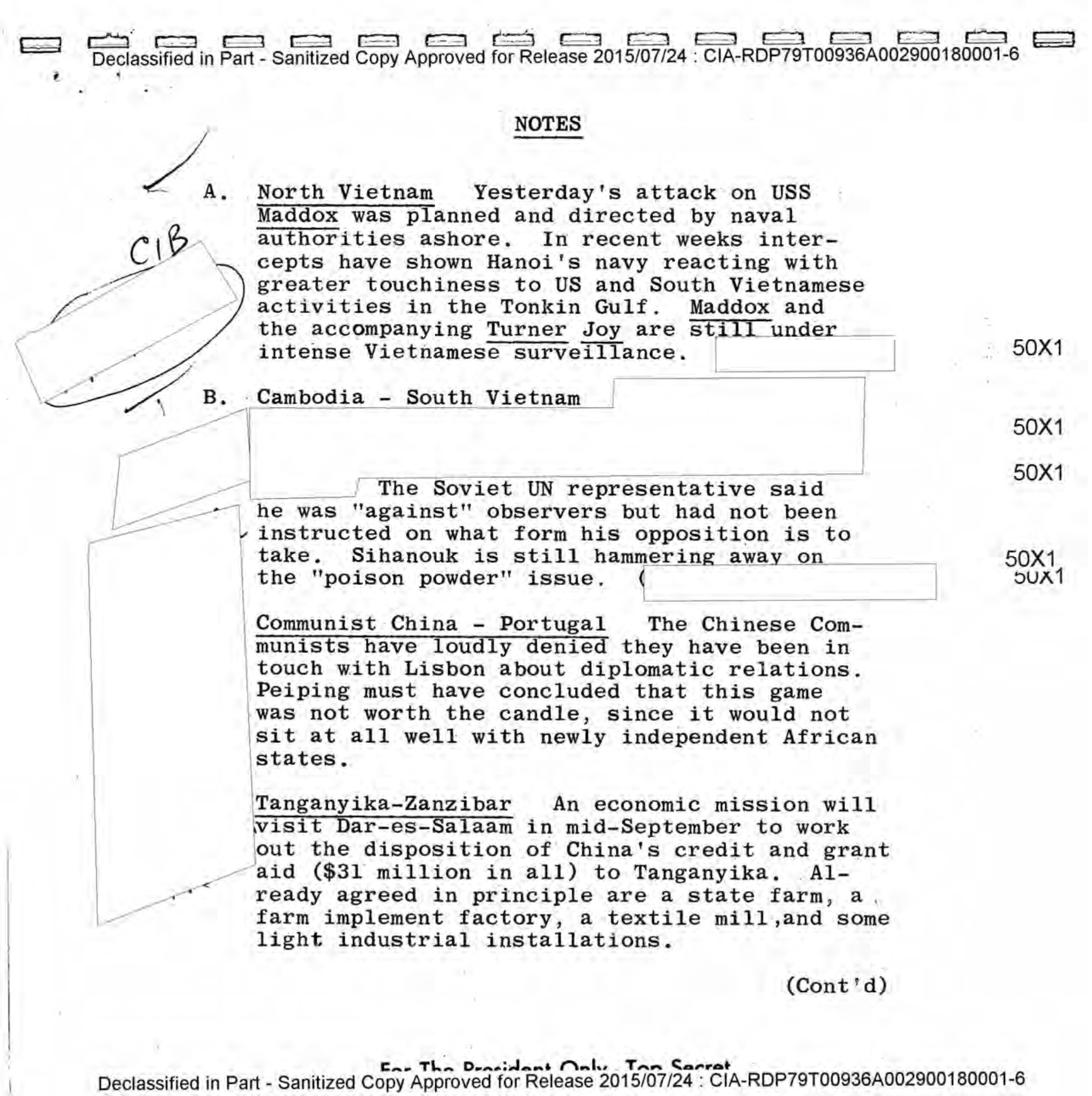
Oct. 17, 1964: China gets the bomb
In addition, the Peiping announcement on China's nuclear test contained no acknowledgement of the sizable Soviet contribution. The success was attributed to China's own
scientists "relying on their own efforts. ”
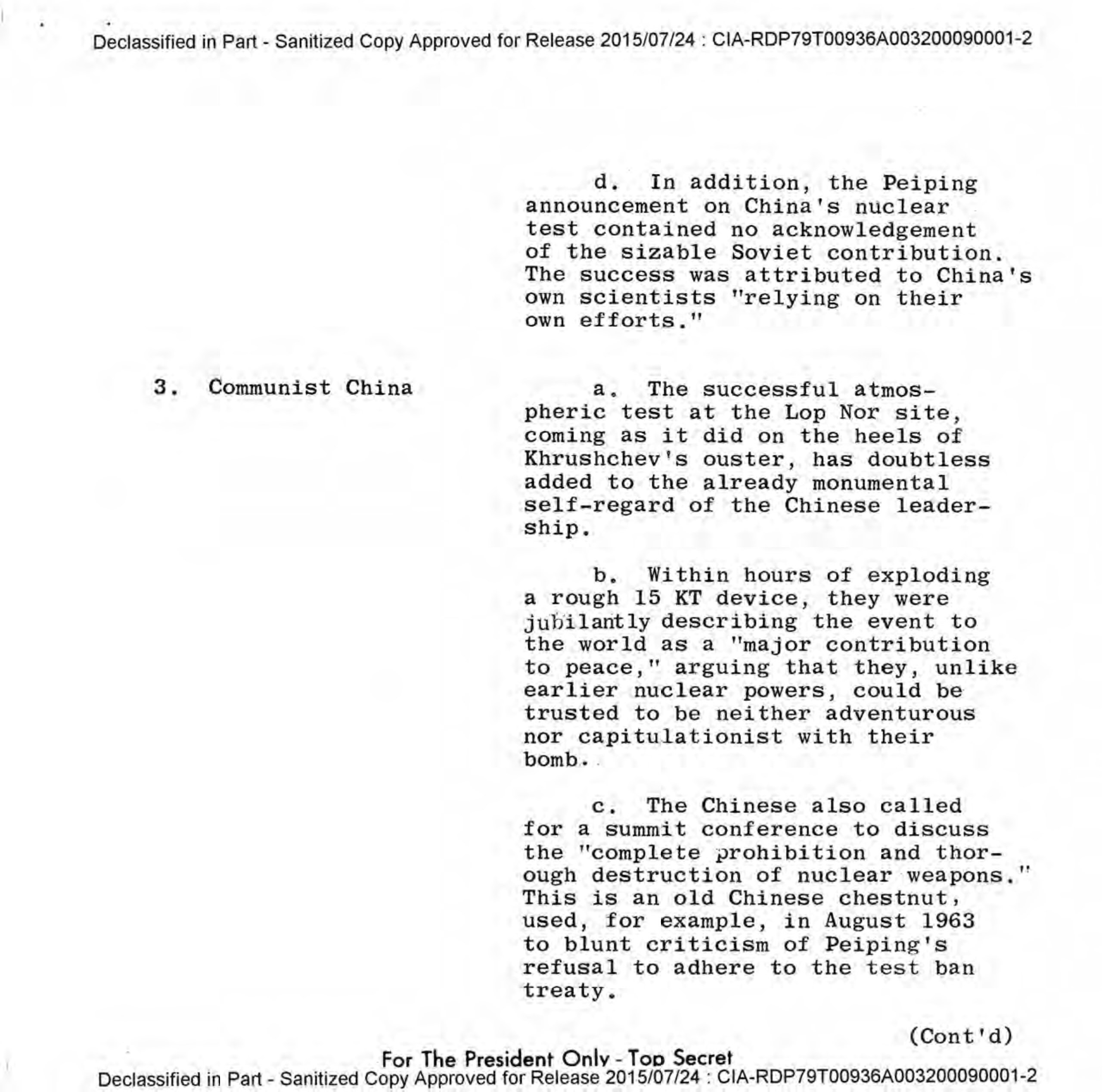
June 5-6, 1967: The Six-Day War
At this point, the shooting continues despite the UN ceasefire resolution. Early this morning Israeli planes were hammering Jordanian positions outside Jerusalem. There also was some firing in the city last night.
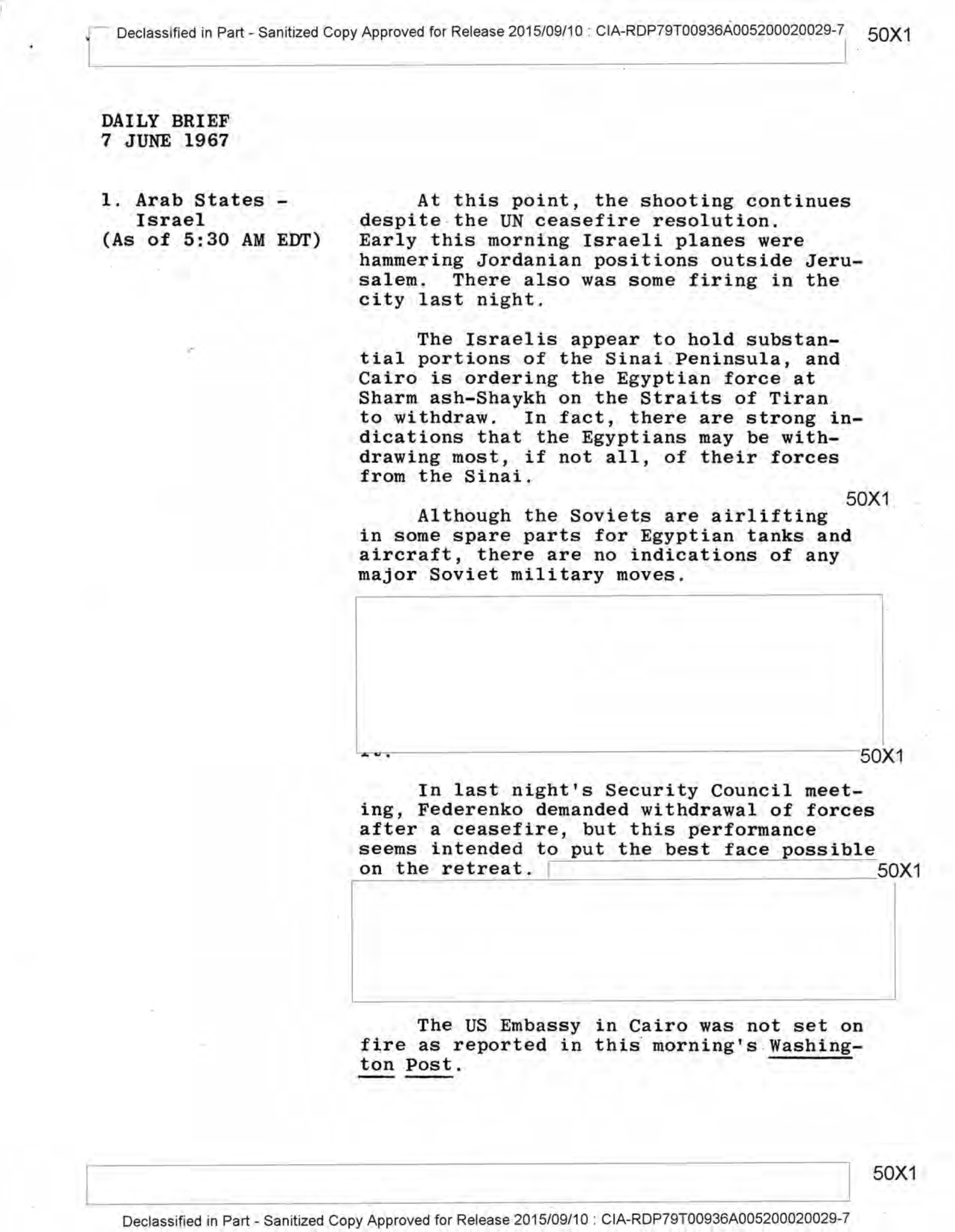
Jan. 31-Feb. 1, 1968: The Tet Offensive
Most enemy forces in the Saigon area were routed by about noon, Saigon time, today. Allied forces are now moving against the remaining pockets of resistance.
In the northern half of South Vietnam, Communist forces remain entrenched in the highland cities of Kontum and Ban Me Thuot. At Hue, an enemy force believed to be of regimental size is still in control of part of the city.
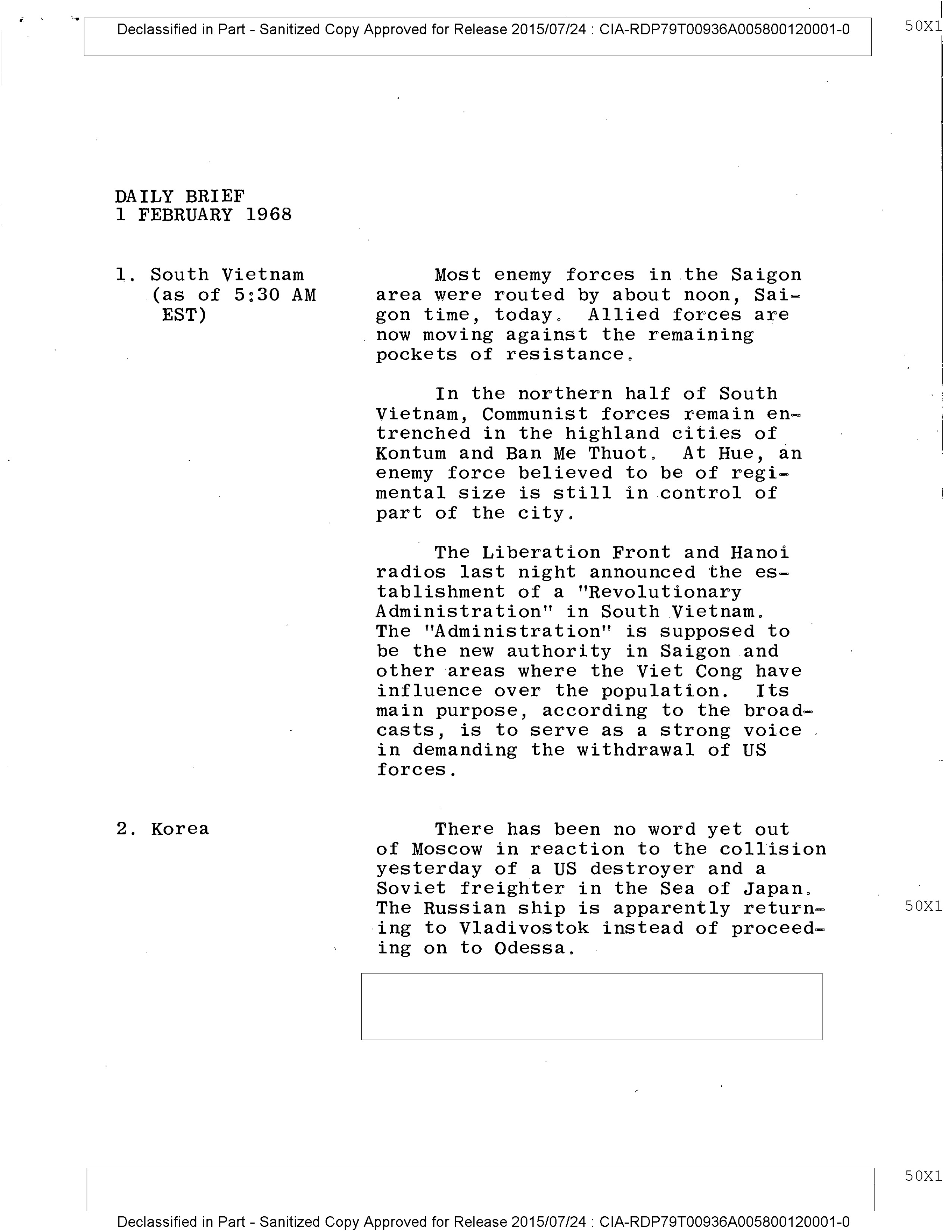
Special Daily Report on North Vietnam - February 5, 1968
In a briefing titled and dated, "Special Daily Report on North Vietnam for the President's Eyes Only, 5 February 1968," the North Vietnamese perception of the American president is conveyed in a quote from a North broadcast about the Communist Tet Offensive as stating, "President Johnson could not eat and sleep properly. He was confused as the man in the moon.'"
Abstract:
Hanoi on the Current Offensive; The Communist military offensive is still being portrayed by Hanoi and the Liberation Front as a spontaneous popular uprising of "revolutionary forces" aiming at overthrowing and replacing the Saigon government. The political and military role of the Liberation Front seems to be downplayed deliberately. The "revolution," as the Communists call the offensive, is said to have generated new, broadly based organizations which, in conjunction with the Front, will eventually establish a coalition government for South Vietnam. These new organizations, the propaganda insists, are winning popular support, but there is an urgent note in Vietnamese Communist statements stressing the benefits of joining in the struggle or of at least supporting it.
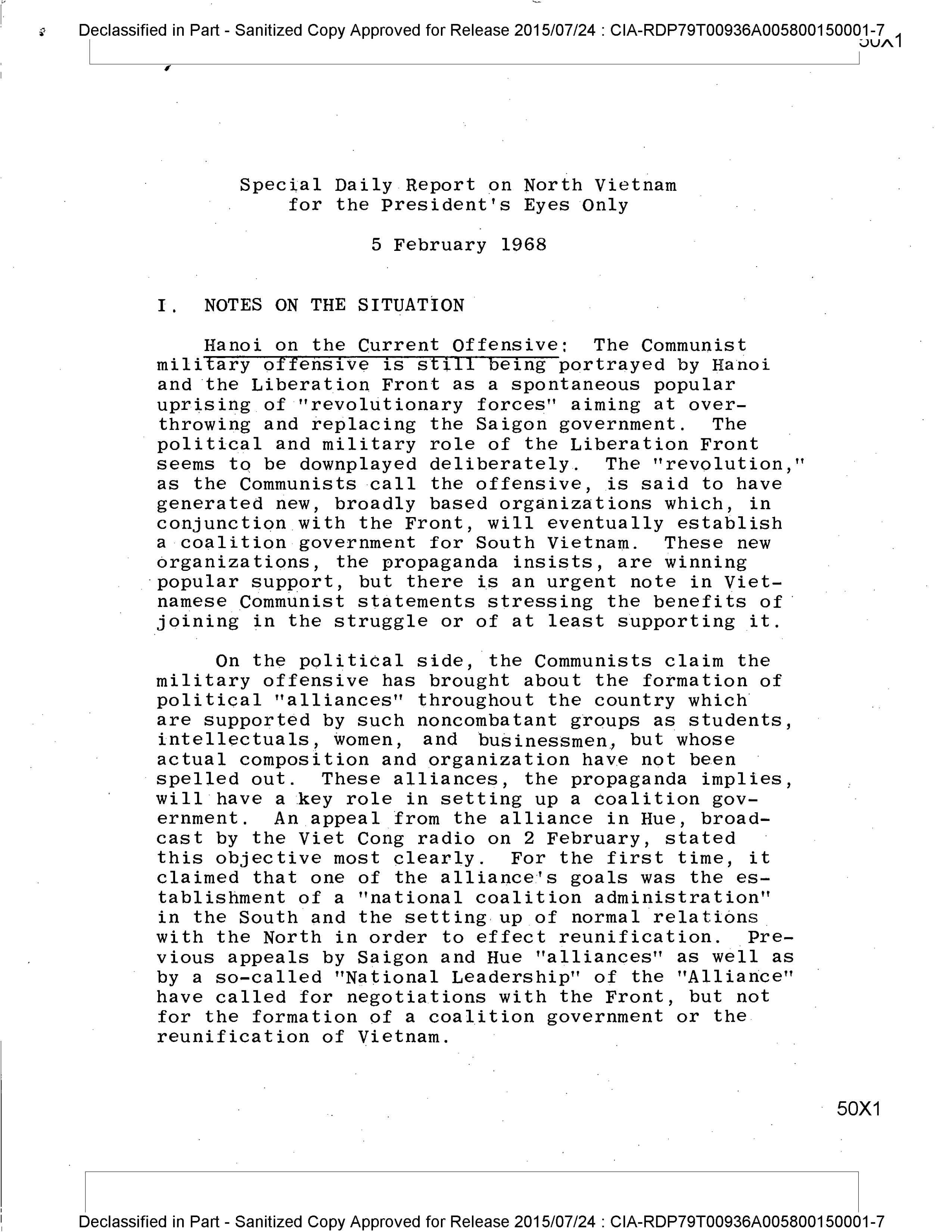
Aug. 21, 1968: Soviet bloc invades Czechoslovakia
Soviet and other Eastern European forces have now occupied Prague and other major population centers. This well-coordinated operation used extensive airlift as well as overland movement.
